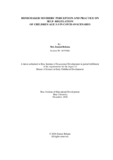| dc.contributor.advisor | Islam, Syeda Fareha Shaheeda | |
| dc.contributor.author | Rehana, Mst. Zannat | |
| dc.date.accessioned | 2021-07-09T17:47:41Z | |
| dc.date.available | 2021-07-09T17:47:41Z | |
| dc.date.copyright | 2020 | |
| dc.date.issued | 2020-12 | |
| dc.identifier.other | ID 18355001 | |
| dc.identifier.uri | http://hdl.handle.net/10361/14772 | |
| dc.description | This thesis is submitted in partial fulfilment of the requirements for the degree of Masters of Science in Early Child Development, 2020. | en_US |
| dc.description | Cataloged from PDF version of thesis. | |
| dc.description | Includes bibliographical references (pages 57-66). | |
| dc.description.abstract | Due to the COVID-19 pandemic, children's self-regulation skill is being hampered. The importance of self-regulation is compulsory, as the behaviours, attitudes and habits developed in pre-school years appear to persist. Due to the COVID-19, the schools are closed for a long time as a result of which the children are in a bad mood, irritable and fussy because of home confinement. Suddenly, homemaker mothers had to handle their kids at home 24 hours a day. In the COVID-19 scenario, the study examined the expectations and practices of homemaker mothers concerning self-regulation of their 3-5-year-old kids.
The study is a qualitative study conducted on 7 homemaker mothers. The data has been collected through in-depth interviews and group discussions over phone calls with the mothers.
The research findings disclosed that mothers have a good idea about self-regulation but they have been struggling to self-regulate their children in this COVID-19 situation. Their preschool children are experiencing problems with daily routine changes, less physical activities, various signs of mental illness which includes depression, stress, short temper, insomnia, and boredom. Many mothers have taken some vital measures to self-regulate certain emotion and behavior skills and also adopted different strategies to enhance the attention skills and thinking skills. They think that due to COVID-19, multiple problems and family inability affect children's self-regulation skills; sometimes, due economic issues and mental stress, children have to take the punishment instead of proper self-regulation. | en_US |
| dc.description.statementofresponsibility | Mst. Zannat Rehana | |
| dc.format.extent | 75 pages | |
| dc.language.iso | en | en_US |
| dc.publisher | Brac University | en_US |
| dc.rights | BRAC University thesis reports are protected by copyright. They may be viewed from this source for any purpose, but reproduction or distribution in any format is prohibited without written permission. | |
| dc.subject | Homemaker mothers | en_US |
| dc.subject | Children 3-5 years age | en_US |
| dc.subject | Self-regulation | en_US |
| dc.subject | COVID-19 scenario | en_US |
| dc.subject.lcsh | Parent and child | |
| dc.title | Homemaker mothers’ perception and practice on self-regulation of children age 3-5 in COVID-19 scenario | en_US |
| dc.type | Thesis | en_US |
| dc.contributor.department | Institute of Education Development, BRAC University | |
| dc.description.degree | M. Early Child Development | |

